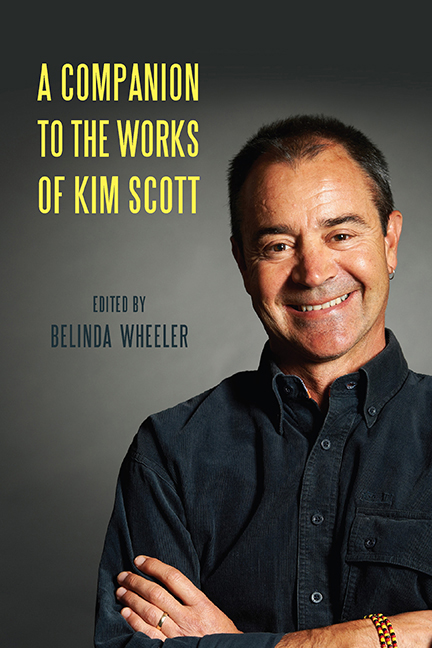Book contents
- Frontmatter
- Contents
- Foreword
- Acknowledgments
- Note on Orthography
- Chronology of Key Writings
- Introduction
- 1 Kim Scott’s Publishing History in Three Contexts: Australian Aboriginal, National, and International
- 2 Kim Scott’s True Country as Aboriginal Bildungsroman
- 3 The Land Holds All Things: Kim Scott’s Benang—A Guide to Postcolonial Spatiality
- 4 Kim Scott’s Kayang and Me: Noongar Identity and Evidence of Connection to Country
- 5 “Wreck/Con/Silly/Nation”: Mimicry, Strategic Essentialism, and the “Friendly Frontier” in Kim Scott’s That Deadman Dance
- 6 The International Reception of Kim Scott’s Works: A Case Study Featuring Benang
- 7 Traumatic Landscapes: Inscribing Spectrality and Identity in Kim Scott’s “A Refreshing Sleep,” “Capture,” and “An Intimate Act”
- 8 Spatial Poetics and the Uses of Ekphrasis in Kim Scott’s “Into the Light” and Other Stories
- 9 The Poetry of Kim Scott
- 10 The Wirlomin Project and Kim Scott: Empowering Regional Narratives in a Globalized World of Literature
- 11 Kim Scott as Boundary Rider: Exploring Possibilities and New Frontiers in Aboriginal Health
- 12 An Interview with Kim Scott
- Notes on the Contributors
- Index
3 - The Land Holds All Things: Kim Scott’s Benang—A Guide to Postcolonial Spatiality
Published online by Cambridge University Press: 08 May 2021
- Frontmatter
- Contents
- Foreword
- Acknowledgments
- Note on Orthography
- Chronology of Key Writings
- Introduction
- 1 Kim Scott’s Publishing History in Three Contexts: Australian Aboriginal, National, and International
- 2 Kim Scott’s True Country as Aboriginal Bildungsroman
- 3 The Land Holds All Things: Kim Scott’s Benang—A Guide to Postcolonial Spatiality
- 4 Kim Scott’s Kayang and Me: Noongar Identity and Evidence of Connection to Country
- 5 “Wreck/Con/Silly/Nation”: Mimicry, Strategic Essentialism, and the “Friendly Frontier” in Kim Scott’s That Deadman Dance
- 6 The International Reception of Kim Scott’s Works: A Case Study Featuring Benang
- 7 Traumatic Landscapes: Inscribing Spectrality and Identity in Kim Scott’s “A Refreshing Sleep,” “Capture,” and “An Intimate Act”
- 8 Spatial Poetics and the Uses of Ekphrasis in Kim Scott’s “Into the Light” and Other Stories
- 9 The Poetry of Kim Scott
- 10 The Wirlomin Project and Kim Scott: Empowering Regional Narratives in a Globalized World of Literature
- 11 Kim Scott as Boundary Rider: Exploring Possibilities and New Frontiers in Aboriginal Health
- 12 An Interview with Kim Scott
- Notes on the Contributors
- Index
Summary
THE PROTAGONIST OF Kim Scott's 1999 novel Benang, Harley, insists that he is writing a “simple family history, the most local of histories” (10; see Slater, “Kim Scott's Benang,” 147). Harley tells the story of four generations of the family Benang, who have been subjected to relentless colonial violence. Scott's novel contests and disrupts national narratives of progress, heroic pioneers, and brave, entrepreneurial settlers by privileging the memories and experiences of Noongar people. The simplicity of the story might lie with the fearlessness with which Scott approaches his material, but there is a simplicity to Scott's determination, which gathers strength throughout the novel: he contests and complicates the British colonial spatial narrative. The colonial imaginary enfolds Aboriginal people into a narrative of European progress, but on the ground beneath our feet, as Scott writes, “there are many stories” (495). By weaving a novel from the fragments of colonial archives, Harley's eugenicist grandfather's diaries and jottings, family memories, the whispers of Noongar relatives, some long dead, and travels through ancestral country, Scott reinvests space with a multiplicity of stories.
Questions of space and place underpin Scott's narrative. In For Space (2005), Doreen Massey investigates the continuance of colonial spatial imaginary: a yearning, longing for spatial coherence, which she argues “enables the existence of only one history, one voice, one speaking position” (42). She calls this an “unthought cosmology,” and argues that we need to bring it into thought. I would add that we must understand the inherent violence of the colonial spatial imaginary and how it continues to shape settler-Indigenous relations. The repercussions of the colonial geographical imagination are that people, places, things, and worlds cannot be understood as independent of Europe. Massey's political interest is in reinvesting space with its interruptive and dislocating consequences. She argues that space is crisscrossed with “stories” (54). This is also the work of Kim Scott's Benang. It is driven by countermemory, and like Harley's ancestors, it is a guide for making space for the coexistence of multiple ontologies and epistemologies.
Style
Scott annexes colonial records and assimilationist discourse into his text and makes colonial Australia speak of its racist and genocidal intentions.
- Type
- Chapter
- Information
- A Companion to the Works of Kim Scott , pp. 37 - 48Publisher: Boydell & BrewerPrint publication year: 2016
- 2
- Cited by



